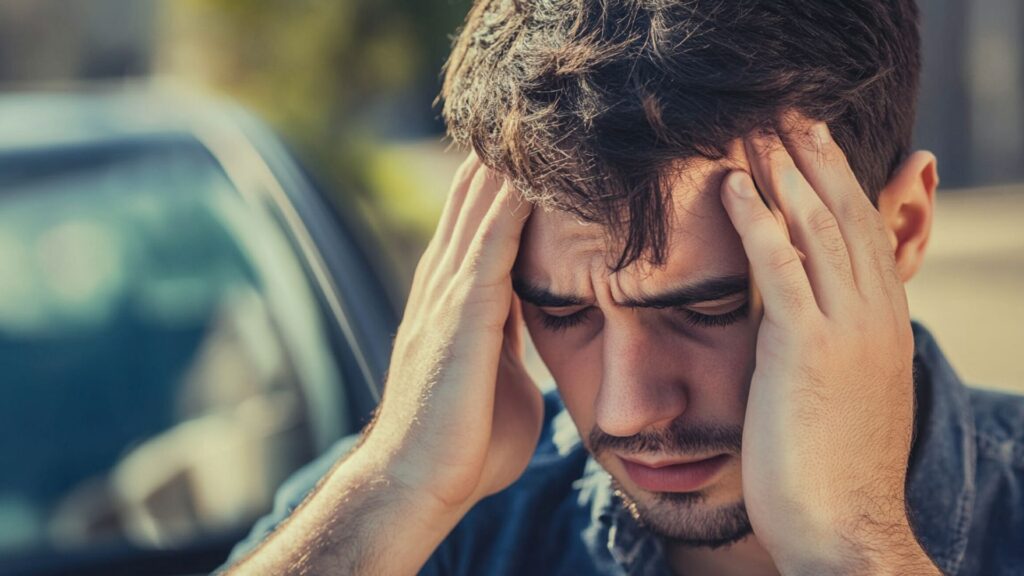After a car accident, many people focus on visible injuries — fractures, bruises, cuts. But what about invisible wounds? Your brain, enclosed in your skull, can be seriously damaged even in seemingly “minor” collisions.
Mood changes after an accident are not just stress or shock. Sudden outbursts of anger, unprovoked tears, and feelings of alienation from loved ones can signal serious changes in brain structures. Depression car crash victims do not develop depression because of weakness of character, but because of real physical damage to neural connections.
If you notice that you have become irritable, forgetful, or apathetic after an accident, these are warning signs. Mood changes after an accident require immediate medical attention. Your brain is crying out for help, and only a specialist can hear that cry and prevent irreversible consequences.
Key Signs of the Problem

A car accident is the cause of many physical and psychological injuries. In addition to the physical damage caused, a person may experience neurological diseases. Neurological diseases usually occur after some time has passed. Many symptoms can’t be explained in the early stages. A person may experience negative social influences, a bad mood, and a depressive state. Mood and emotional disturbances are key signs that lead to serious problems. Assessing persistent mood changes after an accident and a depressive state is essential. Early recognition will help to seek help and receive treatment quickly. Here are the key signs and their characteristics:
- Mood Swings. A person experiences mood swings regardless of the events happening around them. Irritability, overwhelming emotions, fear, or instability are key signs to watch for.
- Depression. A person may become depressed after the incident and feel constant sadness. Depression is accompanied by fatigue, weakness, and inability to do anything productive.
- Anxiety and Panic. Severe signs are anxiety or panic that turn into panic attacks. These are the signs that can cause fear, anxiety, and inability to rest.
- Sleep Problems. Due to depression after a car crash, a person can have serious problems with sleep. A person can get insomnia, disrupt their sleep schedule, and not rest properly.
- Cognitive Difficulties. Serious problems are cognitive difficulties and memory lapses after the accident. After an accident, these problems worsen over time and require serious treatment.
- Fatigue. Warning signs are fatigue and low energy levels throughout the day. A person does not feel satisfied, is constantly exhausted, and loses their ability to work.
What Causes It Neurologically?
A car accident can be a problem for neurological conditions and brain health. Injuries sustained during an accident can be life-threatening for the victim. Even minor injuries can lead to serious illnesses in the future. A person can get a concussion or traumatic brain injury during the crash. Today, emotional trauma and TBI are interconnected and require prompt treatment. A person can’t control their mood and is greatly influenced by the external environment. Here are the key neurological causes of an accident:
- Chemical Imbalance. After a car accident, a brain injury is quite common. Brain injury can change the neurotransmitters that affect a person’s mood. During this condition, dopamine and serotonin cease to be released in the necessary amounts.
- Structural Changes. An accident can cause structural changes that have a significant impact on emotions. Structural changes occur in the limbic system, which is responsible for controlling stress responses and feelings.
- Disruption of Neural Connections. A person can get brain injury and mood swings due to the interruption of neural connections. Trauma has a significant impact on the connections between some regions of the brain that are responsible for mood.
- Inflammation and Swelling. Severe signs are inflammation and swelling of the brain after an accident. These processes are usually accompanied by impaired neurological function. Often, a person experiences depression, worsening mood, and irritability.
Identifying Damage Early
Post-crash mental health can be significantly damaged if you do not seek medical attention in time. An accident endangers a person’s health and even life. Early detection of damage and signs is critically important for proper treatment. A person should recognize symptoms based on their mood, behavior, and depressive state. Early detection is a great way to improve health and save a life. Today, a good neurologist after a car accident will help solve many problems. A person will be able to work through depression and anxiety after a collision. Here are the key symptoms that are important to pay attention to:
- Mental Health Changes. A person notices changes in mental health, anxiety, and sadness. On a permanent basis, a person is emotionally unstable and constantly irritated.
- Memory and Cognitive Issues. Another significant symptom is memory impairment and a decrease in cognitive skills. A person experiences difficulties with communication and has lapses in memory and concentration.
- Behavioral Changes. A common symptom is a change in behavior and social activity. The person can’t properly fit into society and has unusual negative behavior. Depression, avoidance of people, and irritability are common symptoms.
- Physical Symptoms. In addition to mental health and anxiety, the person faces physical indicators. Dizziness, blurred vision, and sensitivity to light are the main symptoms. It is essential to understand that a headache requires treatment and is a severe symptom.
Diagnosis Methods You Should Know

An accident can change a person’s health and outlook on life. Various diagnostic methods are used to identify and assess symptoms. A medical evaluation is critical to recognizing many conditions. Doctors examine anxiety and emotional trauma following TBI after a car accident. Doctors conduct a neurological and neuropsychological assessment for further treatment. Here are the diagnostic methods that characterize it:
- Neurological Examinations. Neurological examinations are the main ones to determine the coordination and reflexes of a person. Neurological examinations include sensory responses for further treatment.
- Cognitive Testing. Doctors include cognitive testing to assess a person’s abilities and memory. Testing helps to solve problems with mental activity in some regions of the brain.
- Imaging Studies. Doctors also conduct imaging studies to diagnose the brain and evaluate internal organs.
- Neuropsychological Assessment. Today, a fairly common method is the assessment of neuropsychological symptoms after a crash. The evaluation includes the psychological and emotional functioning of the person after the tragedy.
- Behavioral Observations. Doctors also examine behavioral observations that include the person’s emotional state and sleep patterns. Behavioral observations help to learn about a person’s energy level and functioning in society.
Treatment & Care Options
After an accident, it is essential to seek help and treatment in a timely manner. Doctors examine the patient, take a history, and prescribe treatment. Treatment is personalized according to the person’s injury and damage. Doctors conduct a specific assessment and help fight depression and improve cognitive skills. Doctors take anxiety and brain injury mood swings into account for ongoing treatment. Here are the key options for patient treatment and care after an accident:
- Cognitive Rehabilitation Therapy. Therapy is done to improve cognitive abilities and memory. Doctors use various methods that include repetitive tasks and performing memory exercises. This process helps develop brain activity and improve memory.
- Drug Treatment. Drug treatment is used to reduce physical pain. Drug treatment is best for stabilizing chemical imbalances. Doctors prescribe antidepressants to relieve mood and painkillers.
- Psychotherapy. Taking into account neuropsychological symptoms after a crash helps to conduct psychotherapy. The method is often used to address emotional reactions. Usually, doctors use cognitive behavioral therapy to improve the patient’s recovery.
- Physical Therapy. Physical therapy is indispensable for improving the coordination and mobility of the patient. In people who have balance problems, this therapy plays an important role. The person learns to rebuild movements and functionally recovers.
- Lifestyle Changes. To avoid depression and anxiety after a collision, a supportive way is to change your lifestyle. Proper stress management and healthy habits play a key role. Lifestyle interventions help to improve physical activity and maintain brain health.
When to See a Specialist
After an accident, it is essential to assess the symptoms and sensations. Many symptoms can go unnoticed by the person and cause neurological damage. Recognizing the symptoms is critical for timely medical attention. It is essential to understand when to seek professional help. Post-crash mental health are severe symptoms that require investigation. Here are the key factors that require prompt treatment:
- Mood and Emotional Issues. The person experiences mood swings and constant irritability and cannot calm down. These symptoms can have negative consequences for the person’s health. Depression also refers to severe injuries that develop into neurological diseases.
- Cognitive Problems. Cognitive impairment, memory lapses, and confusion are the main symptoms. These actions can interfere with the health and functioning of the person. Anxiety attacks and panic attacks can be accompanied by poor sleep and poor quality of life.
- Physical Warning Signs. In addition to anxiety and mood changes after an accident, physical symptoms are essential. Headache, visual impairment, and body pain require a quick solution. These symptoms are dangerous and can indicate serious neurological damage.
Every person who cares about their health should seek help. Everyone can contact qualified healthcare providers and get detailed information about treatment. Medical professionals will take a history and help prescribe individual treatment. The person will receive the necessary help, improve the quality of life, and be able to live normally.
